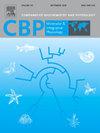Fasting elicits immune modulation and leukocyte redistribution in bullfrogs (Lithobates catesbeianus)
IF 2.2
3区 生物学
Q4 BIOCHEMISTRY & MOLECULAR BIOLOGY
Comparative Biochemistry and Physiology A-Molecular & Integrative Physiology
Pub Date : 2025-04-29
DOI:10.1016/j.cbpa.2025.111873
引用次数: 0
Abstract
An integrated range of behavioral, physiological, and biochemical adjustments reduces metabolic expenditure and energy utilization during fasting to maintain homeostasis. In order to cope with these adjustments, several vertebrates can modulate immune function and corticosterone secretion while fasting to save energy. However, in ectothermic animals that can fast for longer periods due to their low metabolic rate, the underlying corticosterone and immune modulation is still not well understood. This study aimed to investigate corticosterone and immune modulation during fasting in the bullfrog (Lithobates catesbeianus). Bullfrogs were divided into two treatments: a ‘control group’, fed twice a week with fish feed for 31 days; and a ‘fasting group’, which remained fasting for 31 days. On the 31st day of experiment, blood was collected to measure corticosterone plasma levels and immune function (neutrophil/lymphocyte ratio, plasma bacterial killing ability - BKA, and hemagglutination) variables. Fasting did not affect corticosterone plasma levels but increased neutrophil/lymphocyte ratio and hemagglutination, while BKA was decreased. In this way, fasting modulates the innate immune function in male bullfrogs by increasing the NL ratio and hemagglutination activity while reducing BKA, without affecting plasma CORT levels or fat body mass content. Thus, 31 days of fasting induces blood immune cell redistribution and an immunomodulatory response without significant activation of the HPI axis or depletion of energy stores.

禁食引起牛蛙免疫调节和白细胞重新分布
一系列的行为、生理和生化调节减少了禁食期间的代谢消耗和能量利用,以维持体内平衡。为了应对这些调整,一些脊椎动物可以在禁食时调节免疫功能和皮质酮分泌以节省能量。然而,在由于代谢率低而可以长时间禁食的恒温动物中,潜在的皮质酮和免疫调节作用仍未得到很好的理解。本研究旨在探讨禁食牛蛙(Lithobates catesbeianus)期间皮质酮与免疫调节的关系。牛蛙被分为两组:一组是“对照组”,每周喂两次鱼饲料,持续31天;另一组是“禁食组”,禁食31天。试验第31天采血,测定血浆皮质酮水平和免疫功能(中性粒细胞/淋巴细胞比值、血浆细菌杀伤能力- BKA和血凝)指标。禁食不影响皮质酮血浆水平,但增加中性粒细胞/淋巴细胞比率和血凝,而BKA降低。通过这种方式,禁食通过增加NL比率和血凝活性来调节雄性牛蛙的先天免疫功能,同时降低BKA,而不影响血浆CORT水平或脂肪质量含量。因此,31天的禁食诱导了血液免疫细胞的重新分配和免疫调节反应,而没有显著激活HPI轴或消耗能量储存。
本文章由计算机程序翻译,如有差异,请以英文原文为准。
求助全文
约1分钟内获得全文
求助全文
来源期刊
CiteScore
5.00
自引率
4.30%
发文量
155
审稿时长
3 months
期刊介绍:
Part A: Molecular & Integrative Physiology of Comparative Biochemistry and Physiology. This journal covers molecular, cellular, integrative, and ecological physiology. Topics include bioenergetics, circulation, development, excretion, ion regulation, endocrinology, neurobiology, nutrition, respiration, and thermal biology. Study on regulatory mechanisms at any level of organization such as signal transduction and cellular interaction and control of behavior are also published.

 求助内容:
求助内容: 应助结果提醒方式:
应助结果提醒方式:


